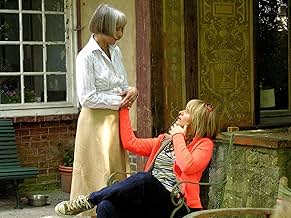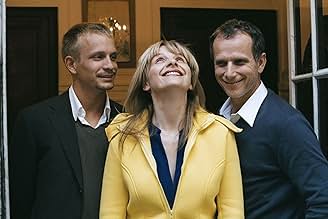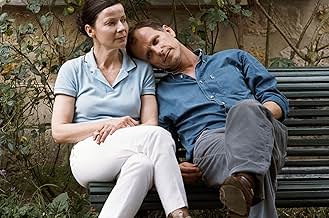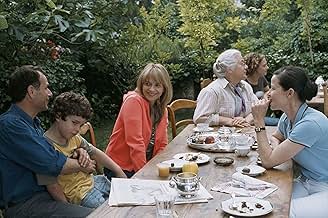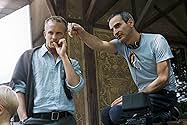IMDb-BEWERTUNG
7,1/10
8436
IHRE BEWERTUNG
Füge eine Handlung in deiner Sprache hinzuTwo brothers and a sister witness the disappearance of their childhood memories when they must relinquish the family belongings to ensure their deceased mother's succession.Two brothers and a sister witness the disappearance of their childhood memories when they must relinquish the family belongings to ensure their deceased mother's succession.Two brothers and a sister witness the disappearance of their childhood memories when they must relinquish the family belongings to ensure their deceased mother's succession.
- Regie
- Drehbuch
- Hauptbesetzung
- Auszeichnungen
- 9 Gewinne & 23 Nominierungen insgesamt
Empfohlene Bewertungen
A film about talented rich people squabbling, albeit very gently, about an inheritance would normally be a candidate to make my hackles rise. But 'Summer Hours' is a sensitive, subtle movie, that explores non-judgmentally what is important to us, and why: in short, how we define our emotional identities. The characters seem likable, but display an ordinary selfishness, and the film lightly samples the passions that make each of them tick. It's a very wordy movie, so much so, it could almost have been a stage play, but the director has a great sense of place, evoking his characters own feelings for place and the movie never feels heavy. In one sense, the ending is a touch underwhelming; but in keeping with the film's overall style. I liked it, a lot: the sort of film that only the French seem to make.
Up until now, you may have seen films that are told through the eyes of a specific character, a child or even a dog. However this film achieves the impossible, it tells the story of generations through the eyes of the objects! The film opens with a large family gathering in a gorgeous old house located in French countryside. The house lies in the middle of a large garden and hosts beautiful antique furniture the owner, mother of three middle aged children, inherited from her uncle. A year later, she dies and the children have to decide about the fate of the house and the furniture.
Anyone who has lost a parent or an elder family member possibly has gone through these difficulties depicted so naturally in the film. However, the movie goes beyond the initial thoughts and feelings. Delicate questions asked by this movie are multifaceted and explore the effects of capitalist globalization on generations.
Those objects have memories in them. When they are left to a museum, they seemingly belong to the society as whole but to no one at the same time.
The elder brother, professor of economy, who lives in France wants to preserve the house, he wants to stick to his roots, to family memories but his brother and sister want to follow their careers in China and US. Yes, by doing so they live in the moment and yes, they are not confined to France and yes, the whole world is theirs but they are also left with nothing. Like objects displayed in the museum.
And this duality lives on until the ironic ending, which can be interpreted as optimistic or pessimistic by viewers even tough pessimistic tone is definitely more prevalent.
Beautiful acting by Binoche, Charles Berling, Edith Scob and wonderful directing and writing by Assayas. This movie is just lifelike, simple but complex!
Anyone who has lost a parent or an elder family member possibly has gone through these difficulties depicted so naturally in the film. However, the movie goes beyond the initial thoughts and feelings. Delicate questions asked by this movie are multifaceted and explore the effects of capitalist globalization on generations.
Those objects have memories in them. When they are left to a museum, they seemingly belong to the society as whole but to no one at the same time.
The elder brother, professor of economy, who lives in France wants to preserve the house, he wants to stick to his roots, to family memories but his brother and sister want to follow their careers in China and US. Yes, by doing so they live in the moment and yes, they are not confined to France and yes, the whole world is theirs but they are also left with nothing. Like objects displayed in the museum.
And this duality lives on until the ironic ending, which can be interpreted as optimistic or pessimistic by viewers even tough pessimistic tone is definitely more prevalent.
Beautiful acting by Binoche, Charles Berling, Edith Scob and wonderful directing and writing by Assayas. This movie is just lifelike, simple but complex!
My only previous Assayas' approach is Maggie Cheung's Cannes BEST ACTRESS nabbing feature CLEAN (2004, 7/10), and for most Chinese media, Assayas seems to alway been in an ill-fated personage as Maggie's ex-husband. But his works matures splendidly with finesse and sobriety (from CLEAN to SUMMER HOURS), the latter resounds a similar pace of meditation and quietude as Hirokazu Koreeda's STILL WALKING (2008, 8/10), tackles with a slice of family life, with a contemplation towards the domestic heredity, globalized opportunism, alienated generations and art conservation.
In dealing with a sentimental demise of a bourgeoisie matriarch, who resides in a suburban villa near Paris with all her uncle's art menagerie and his worthwhile sketching books (apparently he was a renowned painter himself and an unspeakable family secret), Assayas infills an indefatigable stamina to keep all the delicate matters in a civil restraint, the contradiction abounds among three siblings in regard to keep or sell the villa; and the proceedings of donating valuable art pieces has also been a bumpy road; for the elder son, he also has teenage children to worry about, and last but not the least, his abiding remembrance of the past is the most poignant blow to one who can fit into his shoes under the circumstances.
The show has never been slid into a thespians' melodrama notwithstanding the fact that its indulgence of a top-billing Gallic cast, a blonde Binoche incarnates a very light-touch casualness as the metropolitan daughter, living in USA and dedicates herself more in bringing the work of art abroad for the international exposure; Renier, the younger son, finds both an opportunity in settling down in China and an exigent situation in which the profit of selling the villa couldn't come as timely as possible. While these two are soon-to-be-goners, without a pinch yearning for their homeland, the liability all falls on the elder brother (Berling), whose true-to-life embodiment of his character anchors the film's backbone in a concrete formality, it is a prickly situation will come about to anyone eventually. Edith Scob, as the deceased mother, whose first 30-minutes appearance contrives to establish herself as an indomitable shadow encroached by the past, when she is gone, something else will be taken with her together and forever, Scob is pitch perfect in her role's demanding of the physical infirmity, an unswerving mind of knowing her time is up and the duty as a bequeather.
I have not conceal my preference to this quiet, reflective lifelike imitation than other more grandstanding razzle-dazzle, it is a simple film with a concise message delivered eloquently by the mastery of Assayas who auspiciously shoulders on the privilege of an auteur not only in the French terrain, but also as an international landmark, like many of his precedent compatriots.
In dealing with a sentimental demise of a bourgeoisie matriarch, who resides in a suburban villa near Paris with all her uncle's art menagerie and his worthwhile sketching books (apparently he was a renowned painter himself and an unspeakable family secret), Assayas infills an indefatigable stamina to keep all the delicate matters in a civil restraint, the contradiction abounds among three siblings in regard to keep or sell the villa; and the proceedings of donating valuable art pieces has also been a bumpy road; for the elder son, he also has teenage children to worry about, and last but not the least, his abiding remembrance of the past is the most poignant blow to one who can fit into his shoes under the circumstances.
The show has never been slid into a thespians' melodrama notwithstanding the fact that its indulgence of a top-billing Gallic cast, a blonde Binoche incarnates a very light-touch casualness as the metropolitan daughter, living in USA and dedicates herself more in bringing the work of art abroad for the international exposure; Renier, the younger son, finds both an opportunity in settling down in China and an exigent situation in which the profit of selling the villa couldn't come as timely as possible. While these two are soon-to-be-goners, without a pinch yearning for their homeland, the liability all falls on the elder brother (Berling), whose true-to-life embodiment of his character anchors the film's backbone in a concrete formality, it is a prickly situation will come about to anyone eventually. Edith Scob, as the deceased mother, whose first 30-minutes appearance contrives to establish herself as an indomitable shadow encroached by the past, when she is gone, something else will be taken with her together and forever, Scob is pitch perfect in her role's demanding of the physical infirmity, an unswerving mind of knowing her time is up and the duty as a bequeather.
I have not conceal my preference to this quiet, reflective lifelike imitation than other more grandstanding razzle-dazzle, it is a simple film with a concise message delivered eloquently by the mastery of Assayas who auspiciously shoulders on the privilege of an auteur not only in the French terrain, but also as an international landmark, like many of his precedent compatriots.
Assayas says this film more or less sums up all his work so far, and that may surprise some, since it is so different, so indistinguishable in many ways from the work of other contemporary French filmmakers who deal with middle class life. And the impulse behind the film was something trivial and occasional, a request from the Musée d'Orsay to do something, as they'd asked Hou Hsiau-hsien (the result was Hou's 'Flight of the Red Balloon'). Hou's film uses the d'Orsay so incidentally I can hardly remember how it fits in; but Assayas takes the idea of a museum quite seriously and literally. His story is about a family, and a mother who dies in her mid-seventies leaving behind a house and a collection of museum pieces, works of art, furniture, and fine objects.
We begin with a scene quite conventional in French films: the seasonal family gathering. The 'Heure d'été' (summer hour), is a moment when adult siblings Adrienne (Juliette Binoche, the star of Hou's 'Balloon,' though including her again was not a d'Orsay requirement), Frédéric (Charles Berling, his third time in an Assayas film, and a kind of alter ego here), and Jérémie (Jérémie Renier) with parts of their families, have come to the family's beautiful country place to celebrate the 75th birthday of their mother Hélène (Edith Scob). Hélène is one of those perfectly slim, elegant, erect French women. She spends a lot of time telling Frédéric, to his annoyance, about the valuables the children will inherit when she dies, including a handsome 19th-century desk, display case, and other objects, the sketchbooks of her famous uncle, the artist Jean Berthier, two Corot paintings, and two large sketches by Odilon Redon. They will want to dispose of them all, she says, and the house. She has certain requirements. The D'Orsay wants the furniture; the sketchbooks must be kept together. Some objects she is giving to him.
After this sequence, Hélène is dead, perhaps a year later. She has gone to San Francisco for the start of a major traveling exhibition of Berthier's work, and there has been a presentation in France on his personal life (including the fact that he was gay, and other controversial information) which shook her considerably. And her involvement in the production of a book, a catalog, and the traveling exhibition all wore her down and left her devastated and empty when they were completed.
It is against Frédéric 's wishes, but when the siblings meet again, it's obvious Hélène was right and the possessions and the house must be sold, and the old housekeeper, Eloise (Isabelle Sadoyan) must be released. Jérémie, who works for a company that makes running shoes, is going to take his wife and kids to live in China permanently. Adrienne, who is a designer, lives in New York, and she's going to marry her American boyfriend and stay there. They can't go back to the country house regularly any more. It seems Frédéric gets a raw deal, because he, whom the dispersal of family heirlooms hurts the most, is going to have to deal with the nuts and bolts of the process, because he's the only one who lives in France. But that's the way it is, and what's more Jérémie needs money to set up in his new life in China.
Assayas goes into the details, even showing a meeting of the curators and administrators concerned with the donation at the Musée d'Orsay. They are particularly interested in the furniture and the Redons (the Corots are sold elsewhere). One official objects that these things will just go into storage.
This is a suavely composed picture, but it still comes across as the most elegant of instructional films, if such existed for showing at posh schools to teach children of the wealthy how to deal with inheritances in the world of globalization. Yes, globalization is what Assayas is talking about, though the word is used in his comments on the film, not in the screenplay itself. Assayas' didacticism this time is admirably straightforward, and at the same time, the ideas are presented in what for Assayas is an unusually warm context. One of the touchstones is the old housekeeper, Eloise, who returns to the house when it's been shut up, and goes to Hélène's grave to deposit flowers. The important point is that this is not about the traditional family squabble over inheritance. Though Frédéric is saddened, there is no argument, and he and Jérémie pointedly (maybe too pointedly) part friends. There are other little details that are accurate and practical. It's pointed out that Adrienne's plan to sell the sketchbooks in New York through Christie's won't work. The French government is unlikely to let them out of the country. Frédéric is away a lot too, and for whatever reason he has to pick up his teenage daughter, caught stealing, and holding pot. But the final scene, which again is warmly didactic, shows that daughter with her boyfriend and a bunch of her friends invading the old house one last time, saying a sad farewell..
As I'm not the first to comment, this is one of Assayas' simplest films, but it's also one of his most touching and meaningful. Instructional film though it may be, it deals with subject matter that can move the hardest heart. If you don't care about losing a parent, you will surely be touched with the thought of losing the places of your childhood--and family money. If love won't get you, money will. And there is a final meditation by Frédéric at the D'Orsay where he and his wife Lisa (Dominique Reymond) look at the objects they've donated (not in storage) and consider the other trade-off: a contribution to history and the public's culture has been made, but the objects are like prisoners now, shut up in a cold space, robbed of their human context in a family's life.
We begin with a scene quite conventional in French films: the seasonal family gathering. The 'Heure d'été' (summer hour), is a moment when adult siblings Adrienne (Juliette Binoche, the star of Hou's 'Balloon,' though including her again was not a d'Orsay requirement), Frédéric (Charles Berling, his third time in an Assayas film, and a kind of alter ego here), and Jérémie (Jérémie Renier) with parts of their families, have come to the family's beautiful country place to celebrate the 75th birthday of their mother Hélène (Edith Scob). Hélène is one of those perfectly slim, elegant, erect French women. She spends a lot of time telling Frédéric, to his annoyance, about the valuables the children will inherit when she dies, including a handsome 19th-century desk, display case, and other objects, the sketchbooks of her famous uncle, the artist Jean Berthier, two Corot paintings, and two large sketches by Odilon Redon. They will want to dispose of them all, she says, and the house. She has certain requirements. The D'Orsay wants the furniture; the sketchbooks must be kept together. Some objects she is giving to him.
After this sequence, Hélène is dead, perhaps a year later. She has gone to San Francisco for the start of a major traveling exhibition of Berthier's work, and there has been a presentation in France on his personal life (including the fact that he was gay, and other controversial information) which shook her considerably. And her involvement in the production of a book, a catalog, and the traveling exhibition all wore her down and left her devastated and empty when they were completed.
It is against Frédéric 's wishes, but when the siblings meet again, it's obvious Hélène was right and the possessions and the house must be sold, and the old housekeeper, Eloise (Isabelle Sadoyan) must be released. Jérémie, who works for a company that makes running shoes, is going to take his wife and kids to live in China permanently. Adrienne, who is a designer, lives in New York, and she's going to marry her American boyfriend and stay there. They can't go back to the country house regularly any more. It seems Frédéric gets a raw deal, because he, whom the dispersal of family heirlooms hurts the most, is going to have to deal with the nuts and bolts of the process, because he's the only one who lives in France. But that's the way it is, and what's more Jérémie needs money to set up in his new life in China.
Assayas goes into the details, even showing a meeting of the curators and administrators concerned with the donation at the Musée d'Orsay. They are particularly interested in the furniture and the Redons (the Corots are sold elsewhere). One official objects that these things will just go into storage.
This is a suavely composed picture, but it still comes across as the most elegant of instructional films, if such existed for showing at posh schools to teach children of the wealthy how to deal with inheritances in the world of globalization. Yes, globalization is what Assayas is talking about, though the word is used in his comments on the film, not in the screenplay itself. Assayas' didacticism this time is admirably straightforward, and at the same time, the ideas are presented in what for Assayas is an unusually warm context. One of the touchstones is the old housekeeper, Eloise, who returns to the house when it's been shut up, and goes to Hélène's grave to deposit flowers. The important point is that this is not about the traditional family squabble over inheritance. Though Frédéric is saddened, there is no argument, and he and Jérémie pointedly (maybe too pointedly) part friends. There are other little details that are accurate and practical. It's pointed out that Adrienne's plan to sell the sketchbooks in New York through Christie's won't work. The French government is unlikely to let them out of the country. Frédéric is away a lot too, and for whatever reason he has to pick up his teenage daughter, caught stealing, and holding pot. But the final scene, which again is warmly didactic, shows that daughter with her boyfriend and a bunch of her friends invading the old house one last time, saying a sad farewell..
As I'm not the first to comment, this is one of Assayas' simplest films, but it's also one of his most touching and meaningful. Instructional film though it may be, it deals with subject matter that can move the hardest heart. If you don't care about losing a parent, you will surely be touched with the thought of losing the places of your childhood--and family money. If love won't get you, money will. And there is a final meditation by Frédéric at the D'Orsay where he and his wife Lisa (Dominique Reymond) look at the objects they've donated (not in storage) and consider the other trade-off: a contribution to history and the public's culture has been made, but the objects are like prisoners now, shut up in a cold space, robbed of their human context in a family's life.
This is a haunting film about the distorting effects of monetary exchange on family life and the cohesion of society. It will give food for thought to anyone with elderly parents who may have accumulated a few works of art during their lifetime. At a time of grief, the bereaved have difficult questions to answer. The film-goer is left wondering, "What would I have done if I had been in a similar situation?" It is not a film to be quickly forgotten. Although the issue of the fate of the family's country house may be a specifically French theme, others dealt with are more universal and have a deep resonance for anyone with elderly relations. Juliette Binoche may be the name that draws film-goers in, but there is fine acting from all the performers.
Wusstest du schon
- WissenswertesThis film is part of the Criterion Collection, spine #513.
- PatzerGrandmother's two most valuable objects, the Corots, are hung where they'll both get lots of sunlight, guaranteed to damage the colors. Since once gets the definite impression that little in the house has changed over many years, these pictures would be toast by now.
- SoundtracksLoftus Jones
Written by Turlough O'Carolan
Performed by Robin Williamson, Mat Maneri and Barre Phillips
Top-Auswahl
Melde dich zum Bewerten an und greife auf die Watchlist für personalisierte Empfehlungen zu.
- How long is Summer Hours?Powered by Alexa
Details
- Erscheinungsdatum
- Herkunftsland
- Offizielle Standorte
- Sprachen
- Auch bekannt als
- Summer Hours
- Drehorte
- La Saglière, 8 Rue de Parmain, Butry-sur-Oise, Val-d'Oise, Frankreich(the Berthiers' house)
- Produktionsfirmen
- Weitere beteiligte Unternehmen bei IMDbPro anzeigen
Box Office
- Budget
- 4.400.000 € (geschätzt)
- Bruttoertrag in den USA und Kanada
- 1.657.001 $
- Eröffnungswochenende in den USA und in Kanada
- 49.484 $
- 17. Mai 2009
- Weltweiter Bruttoertrag
- 7.835.857 $
- Laufzeit1 Stunde 43 Minuten
- Farbe
- Sound-Mix
- Seitenverhältnis
- 1.85 : 1
Zu dieser Seite beitragen
Bearbeitung vorschlagen oder fehlenden Inhalt hinzufügen

Oberste Lücke
By what name was Ende eines Sommers (2008) officially released in India in English?
Antwort







